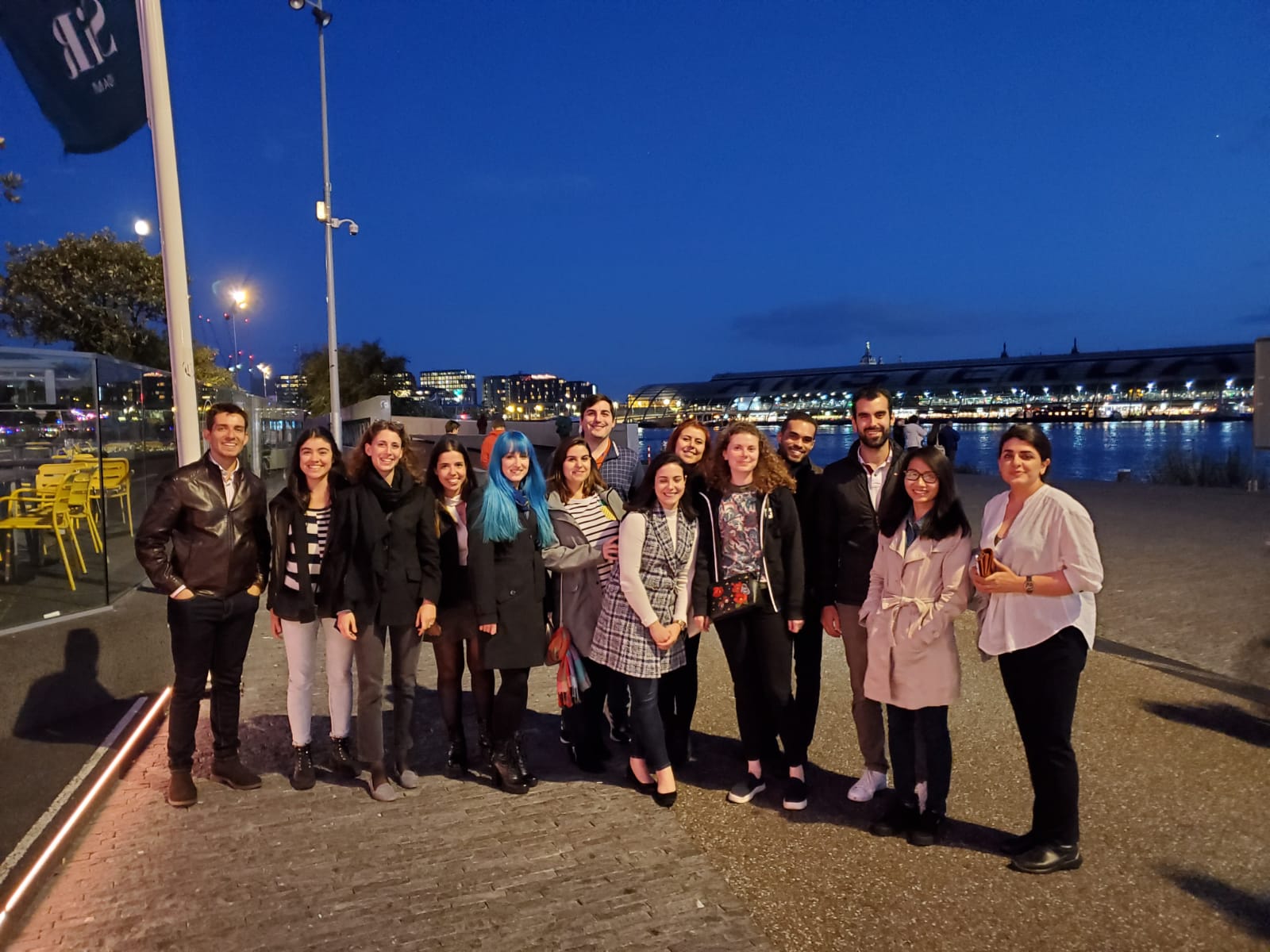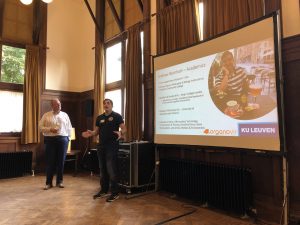
03 Oct OrganoVIR’s Big Start Event – perspectives from a PhD student
Welcome drinks, Lloyd Hotel, 8 September 2019: the first bite
‘A dense group of people is gathered at the bar counter. Everyone is chattering, very excited but a little embarrassed – at least until their pint is over half empty. Many people shaking hands, introducing themselves. I have a few dozen new names to remember and I barely remember the surname of my supervisor Joana (she is Portuguese and has a very long surname)…’
All that slight initial shyness had already disappeared a few moments later. While we were having dinner, I even said to my colleagues that I would love hosting them at my place in Rome, in case they wanted to visit my native city during holidays. Dinner ended. Not even three hours together and we created a WhatsApp group. In addition, I could remember most of the new names. Not bad for (not so) perfect strangers!
The true Big Start Event, Lloyd Hotel, 9 September 2019: an unusual speed dating session
‘Oh dear! We have to be at the Lloyd Hotel at 8 a.m. in the morning…’
All the PhD students headed to the venue together, without having had a coffee yet. As soon as we found the coffee machines, we rushed in and, a few minutes later, all of us were sipping coffee or tea from contemporary candy-pink cups, which contrasted with the old-fashioned wooden conference room. With relief, we attended the welcome introduction, followed by an unusual speed dating session. The rules were simple: we had a minute to introduce ourselves and talk about our interests with each partner or mentor. In that case, read “a minute” as “any time range between one and ten minutes”. Needless to say, at first it was a mess, but then our project manager Angelica Reitsma took over the lead in a very scientific manner with the timer that marked the end of our brief but intense interviews. I think it was the funniest and most inspiring speed dating in history as I had the chance to talk with almost every person involved in OrganoVIR. Very good for the first speed dating experience in my life. Imagine doing this at every international conference!
I perceived a very friendly atmosphere. Mentors were willing to share also their personal experiences with the new generation of students, emphasising how the importance of a happy work-life balance is often sadly overlooked in science. Partners and universities’ presentations followed and all the subjects related to OrganoVIR were mentioned: fundamental biomedical research meets applied research, industry, ethics, communication, and management.

Workshops and courses, Amsterdam UMC, 10 & 12 September 2019: a pinch of virology & models for research, the perfect seasoning for beginners
‘Remember: listen to This Week in Virology podcasts by one of the greatest virologists, Professor Vincent Racaniello!’
Many of the themes anticipated during the Big Start Event were further elaborated during the workshops. Firstly, Prof. Dr. Frank van Kuppeveld gave us a basic but inspiring lecture on the viral replication cycle, highlighting the crucial steps for a virus to thrive. The same steps served to list the common antiviral targets. He also suggested us to listen to Prof. Vincent Racaniello’s podcasts dealing also with scientific divulgation, underlining the importance of broad public education towards vaccines, and scientific research in general.
The second lecture was held by Dr. Dasja Pajkrt, a specialist in the field of paediatric infectious diseases. It was structured as a sort of quiz: she showed us the symptoms of some of her previous patients and we had to guess the diagnosis together. I really enjoyed this interactive workflow, because it stimulated our reasoning skills. Moreover, we could appreciate the clinical significance of our work, from bench to patients.
The final lecture was given by Dr. Dirk Jochmans whose research focuses on novel antiviral therapies for neglected and emerging viral infections. Together with the historical milestones of antiviral strategies, he presented the challenges and the costs of antivirals development. We are now more aware of the realistic time lapse required to commercialize a new drug. Overall, the three lectures acted as a concerted brainstorming session and I am convinced that everyone came out of this workshop with a thousand ideas in mind!
Visiting Amsterdam and sharing our personal stories: we take the first steps towards a shared doctoral path
‘Leave your thoughts, relax, and… Doe normaal!’
The day of the Big Start we also had a very nice guided walking tour through Amsterdam. Among the red-light district and the mighty history of Dutch merchants, I was impressed mainly by one insight about Dutch culture explained by our hilarious American guide: the meaning of the expression “Doe normaal!”. It literally means “just act as a normal person (for God’s sake!)”, an expression to be used when an impatient cyclist manifests his/her willingness to kick you off the bike path, because you are apparently riding too slow. Each one can interpret this expression differently. Personally, I believe it is a good admonition to find the measure of things again. We are just little dots in the vastness of the universe, does it really matter to cycle so fast? Maybe we could wake up earlier to reach our destination or we could evaluate a faster pathway. If we consider the obstacles and setbacks on the cycle path as the limits in the road of our career, then it is reasonable to take some time to think how to overcome our limits just “step by step”. Indeed, the life of a PhD student is sometimes undermined by stress, deadlines, and failures. In those moments, we should take a deep breath, keep calm and re-focus again because after all, as Dasja mentioned during the workshops, there are people beyond things.

Similar concepts were explored during the first session of our Personal Developmental Plan with Ingrid Valks: “Passion and purpose in life”. We talked about our interests and our dreams, but we also discussed the importance of emotional intelligence as an essential skill for a new generation of scientists. Meanwhile, we had meditation and yoga sessions during which we started to learn how to relax and free our minds to acquire mindfulness during our daily life, when it is important to take care of ourselves. Naturally, this goes together with taking care of the environment by adopting sustainable habits as well as eating healthy and “km0” food.
‘We are all standing in a circle and we narrate determinant events that shaped who we are at present. Ingrid starts and she passes a ball of wool to the next person holding back the wool wire and so do we. At the end, we create a net connecting each other, connecting our diversity in culture and our personalities.’

